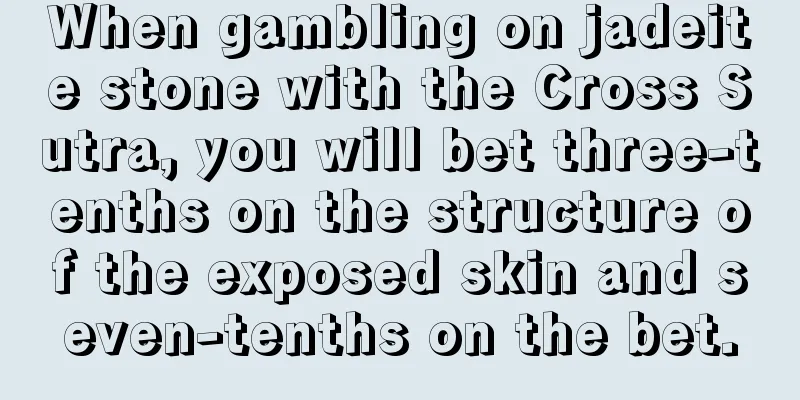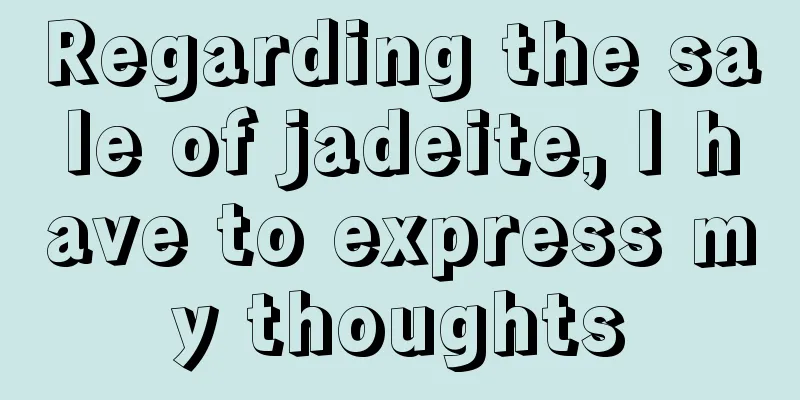Jade professional knowledge: "Jade Luster"

|
Jade is a jade stone with a polycrystalline interwoven structure. Simply put, it is a collection of countless translucent mirrors with their own reflective properties. The "mirrors" of jade not only reflect each other, but also shoot at each other. These optical reactions constitute what we often call the gloss of jade. In the jargon of the jade industry, the best quality light performances are fluorescent light, oily light and rigid light, followed by glass light and then waxy light. The worse performance is stone light. The luster of jade is actually a normal optical phenomenon. The micro-crystals inside the jade are arranged neatly and orderly, causing the overall refractive index to become more obvious after light enters the jade. Jade with a fluorescent feeling can give people the feeling that the jade is brighter than its surroundings at any angle. Theoretically speaking, all jadeite of the glutinous grade and above may exhibit the fluorescence phenomenon, and the closer the shape of the jadeite is to a perfect circle, the more obvious the fluorescence effect will be. This is also one of the reasons why carvers try to make spherical objects and figures as round as possible in finished jade products. Oily sheen means that visually, we can see that the jade seems to have been brushed with oil. This requires the jade crystals to be quite fine. When light enters jade, the same beam of light is decomposed into many rays of uniform size that gradually diffuse. They are evenly distributed on the surface of jade crystals, ensuring the transparency of the jade while also reflecting the shape of the light when it shines on a single crystal. Rigid light represents the extraordinary transparency and reflective ability of jadeite crystals. In the jade market, we often hear the terms "full of hardness, having a strong flavor, and having hardness", which refer to this ability. Vitreous luster is a light characteristic possessed by most jade products. Jadeite with a glassy luster usually has crystals of average quality and a relatively tight arrangement. As for the waxy luster and stone luster, they usually appear on inferior jadeite. The main problem with jadeite of poor quality is that the crystals are loose, the quality is tender, and the light transmission effect is poor. No matter how good the water head of the jadeite is, it will have a loose visual effect. This is wax light. Stone luster, as the name suggests, means that jade is like stone and its luster is not strong. After polishing, jadeite with this kind of glossiness will hardly have the transparency of other types of jadeite. It lacks spirituality and looks like a piece of stone. fruit fcgc99 |
<<: There are so many styles of jade inlays, which ones are must-buys?
>>: Jadeite with glue, hardness and luster is of high value
Recommend
What is the jade processing process from raw stone to art? I was shocked after watching it!
Jade has always been a kind of jade that is deepl...
The Damakan jadeite with skin is ingeniously carved with the theme of Bodhidharma, which is exquisite and exquisite
The material is a Damakan jadeite rough stone wit...
Jade carving is also an art
Generally speaking, perfect jade carving is refle...
3 points to help you identify jadeite, a must-read for beginners
The correct definition of jadeite is a fibrous ag...
Jade Appreciation | 2019 "Lu Zigang Cup" Boutique Exhibition
On the morning of September 27, the 11th China Su...
Appreciation of 6 exquisitely shaped and uniquely designed jade works
The refreshing Qingshui base is cleverly carved w...
How to distinguish jadeite from water foam?
There are several obvious differences between jad...
Take a look at those exquisite jadeite that are like fairyland!
Comparing people will make you cry; comparing goo...
Be wary of what the jade industry calls the "Heavenly Fairy Picture"!
In recent years, people's love for jade has b...
The first jadeite in autumn is worth having
Golden autumn, golden autumn, A golden word point...
In addition to green, what other jadeite has potential stocks?
When we talk about potential jade stocks, we mean...
What is the meaning of jade cabbage ornaments? The meaning of the little cabbage is so beautiful
I believe everyone is familiar with cabbage. Espe...
How are exquisite jade products processed? Don't make the process too complicated...
Glutinous full green landscape jadeite As the say...
What kind of jade is the best? How do novices choose jade?
Jade has fresh and elegant colors , and is very s...
How to distinguish the authenticity of black jadeite? Is black jadeite jade?
Today I want to talk to you about black jadeite. ...









